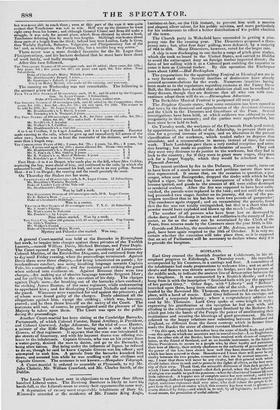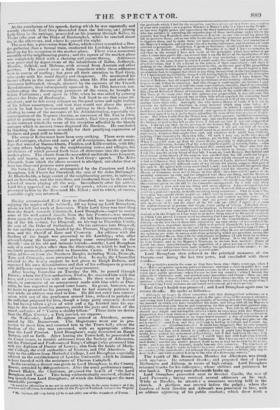SCOTLAND.
Earl Grey crossed the Scottish frontier at Coldstream, in his tri- umphant progress to Edinburgh, on Thursday week. He travelled, accompanied by his Countess, in a carriage and four. A committee of the inhabitants had made preparations to welcome him ; and an arch of shrubs and flowers was thrown across the bridge, over the keystone of
the middle arch, to indicate the ancient line of demarcation between the two kingdoms. It was surmounted by a Scottish thistle; and a flag hung from it with the inscription " Scotland hails with joy the approach of her patriot Grey." Other flags, with " Liberty " and "Reform" inscribed upon then;, hung from either side of the arch. A procession, beaded by the Reverend Mr. Thomson, then proceeded to the ma,ket- place, with a band of music. Earl Grey followed in his carriage, and ascended a temporary balcony ; where a congratulatory address was read by Mr. Thomson. Lord Grey spoke at some length in reply ; expressing his gratification at the reception he had met with, and alluding to the advantages conferred upon Scotland by the Reform Act, which put into the hands of the People the poWer of ameliorating their institutions and securing the blessings of good government. He then referred to the happy relations now subsisting between Scotland and England, so different from the fierce contests which- in former times made the Border the scene of almost constant bloodshed- " On this spot, which has heretofore been the scene of deadly feuds and strifes —on this spot, on which our ancestors met in mortal combat-1, an Englishman, from the other side of the Border, have been received with shouts of congratu- lation, as the friend of Scotland, and as an humble instrument, in the bands of Divine Providence, to secure to a people who, by their loyalty and patriotism, their love of liberty, their orderly obedience to the authority of government and the power of the law, have showir how well they have deserved the blessing which has beets secured to them. Henceforward I trust there will never be any rivalry between the two peoples, connected as they are by mutual interests. I say, I trust that there will never be any rivalry, but that general wish which sheuld induce those to seek and to promote the rights of others, as the best secu- rity of their own. Thank God, the miserable distresses of that dark period, to which 1 have alluded, have ceased—that dark period, when the holier influence of religion was unable to quell the passions—when the charities of human life were little cultivated. A happier tees of complete union has now arrived ; and I trust that nothing shall ever happen to alter this happy state of things—that no UDIUPI. cip!ed, ambitious statesman shall ever arise, who shall induce the people to de. pint from that prudent course which this country has been wont to parsuc,—a course dictated by duty,—and which is, to seek, by all legitimate, tied comma• tional means, the promotion of useful reform."
At the conclusion of his speech, daring which be was repeatedly and warmly cheered, Earl Grey descended from the balcony, an I joining Lady Grey in the carriage, proceeded on his journey through Kelso, to Flours (the scat of the Duke of Roxburghe), which he reached about five in the afternoon, and where he passed the night.
The next day, a procession from Kelso, which rather resembled a Bor- der gathering than a formal train, conducted his Lordship to a balcony fitted up for his reception in the market-place. There was a numerous assembly of tbe neighbouring gentry ; and the square of the market- place was completely filled with a cheering aril joyous throng. Addresses were presented by deputations of the inhabitants of Kelso, Jedburgh, Hawiek, Selkirk, and Melrose, with several from Ancrum and other parishes. The crowd were a little impatient while these addresses were in course of reading ; but gave all their attention to Earl Grey, who spoke with his usual dignity and eloquence. He mentioned his former efforts in the cause of Reform, when Mr. Pitt and other able statesmen befriended, though, alarmed by the excesses of the French Revolutionists, they subsequently opposed it. In l792, however, not- withstanding the discouraging prospects of the -cause, he brought it before Parliament ; and again in l79S, when lie was aided by (among others) the Duke of Roxburghe. lie had lived to see that cause tri- umphant; and he felt every reliance on the good sense and right feeling of his fellow countrymen, and that they would not abuse the power which he had been instrumental in putting in their hands. After alluding to some of the measures of his Administration; especially the emancipation of the Negroes (having, as successor of Mr. Fox in 18116, aided in putting an end to the Slave.trade), Earl Grey again referred to the contrast which the scene of his reception afforded to the bloody outrages which in ancient times disgraced the Borders. He concluded by thanking the numerous assembly for their gratifying expression of kindness and good-will to himself.
The scene at Kelso must have been very striking. There were num- bers of carriages, chaises and carts of all descriptions, bands of music, flags that waved at Bannockburn, Flodden, and Killiecrankie, with fifty or sixty others belonging to the neighbouring towns and villages, the inhabitants of which poured forth from all directions into the spacious market-place. The cheers from the assembled multitude were frequent, loud, and hearty, at every pause in Earl Grey's speech. The Kelso Chronicle, from which the above account is abridged, calculates that at least ten thousand persons were present.
On Satuiday, Earl they, accompanied by the Countess and Lady Georgiana, left Flom for Oxenford, the seat of Sir John Dalrymple. At Blackshields, a large escort of the neighbouring gentry, in carriages and on horseback, met the travellers, and conducted them to the castle ; a band of music playing all the way. Immediately after his arrival, Lord Grey appeared on the roof of the porch ; where an address was presented to him by the Reverend Mr. Elliot ; and to which, of course, a suitable reply was returned.





















 Previous page
Previous page